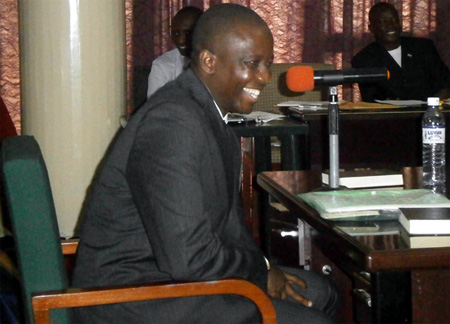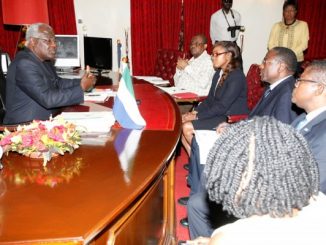
According to very credible reports reaching this press, the Torchlight can authoritatively state that the Deputy Minister of Health and Sanitation 1, in the Ministry of Health and Sanitation, Dr Abu Bakarr Fofanah is all set to temporarily relocate to the eastern city of Kenema from where he will oversee the design and implementation of disease control measures in the eastern region of the country that will eventually relegate the Ebola epidemic to the history books.
DR. ABUBAKARR FOFANA
It could be recalled that recently, the World Health Organization (WHO) which is the global public health governing body to which Sierra Leone is a signatory declared the sub-regional epidemic a global emergency, and His Excellency the President Dr. Ernest Bai Koroma referred to the epidemic as extraordinary and therefore should be confronted with extraordinary and unprecedented measures and declared a State of Public health Emergency. The international aid agency Doctors without Borders (MSF) have painted a gloomy picture of the epidemic by stating that it is out of control, and that will take at least half a year to control.
According to the Deputy Minister, his temporary relocation to these hot spots as Resident Coordinator and Chairman of the Regional Emergency Operational Centre (EOC)will serve several purposes. It will continue to give the on-going efforts to fight the disease the political visibility it deserves as well as serve as a morale booster to his front line health staff. While in the districts, he will use the opportunity to continue to engage the people in the area of education and sensitization by embarking on what the Deputy Minister described as a ‘changing mind-set’ campaign which according to the Deputy Minister is key to the containment of the disease.
Besides providing political and administrative leadership to the regional structure which is the Emergency Operational Centre, the heartbeat of the Ebola response that he is going to lead, Dr. Fofanah will also leverage his professional knowledge to render across the board technical support to all the technical pillars crucial to the fight against the Ebola disease like the surveillance and laboratory, and the case management pillars.
When asked what he makes of his new assignment and that if he is not afraid for his life by not only visiting the Ebola hot spots but actually going to reside there, the Deputy Minister responded that he viewed his new assignment as a call to national service, coming at a time when our very survival as a nation has become a matter of collective responsibility, and His Excellency has admonished everyone to put their shoulders to the wheels of the machinery that will propel the response strategy on the trajectory of victory.
Asked what in his professional opinion is the key to the containment of the condition, the Deputy Minister in a cool and calculated manner reticent of an accomplished professional, had this to say:“The current Ebola epidemic is the first in West Africa but definitely not the first in Africa or the world for that matter”. “So we have a wealth of literature on the interventions that work”. He expressed high optimism that the current Ebola virus disease outbreak can be contained even before the 60 to 90 days timeline that has been announced by the government. He outlined a range of measures he considers to be the key to the containment of the disease.
Dr. Fofanah opined that the containment of the disease relies on the removal from the community of all infectious cases. The attainment of this goal in turn rests on a number of strategies. Among these strategies are (1) Community sensitisation, education, mobilisation, to raise awareness of the condition among communities and elicit collaboration and cooperation (2) measures to ensure community compliance with health regulations (3) a well-structured and adequately equipped and motivated surveillance system capable of mounting robust active surveillance and reporting, and contact tracing and monitoring. (4) Structures for the management of patients affected by the EVD that the local communities can have faith and confidence in including a well-motivated workforce and (5) a well-structured coordination system to coordinate the activities of the various pillars.
The Deputy Minister emphasised the point that in all of the above cost-effectiveness should be born in mind. He cited the fact that we are a resource-constrained country, have no firm idea as to when we will catch up and overtake the epidemic and relegate it to the history books, and above all donor support has been unpredictable so far. He said the Ebola issue is a more of a public health issues that a clinical issue. What sets aside public health interventions aside from clinical medicine is that public health interventions are people /public centred. Public health approaches put the people in the driving seat by employing strategies that are culturally sensitive, have high impact, cost-effective, and therefore acceptable to local communities. The above measures backed by soft militant approaches to ensure compliance through the use of local administrative structures will go a long way towards containing the epidemic.




Leave a Reply